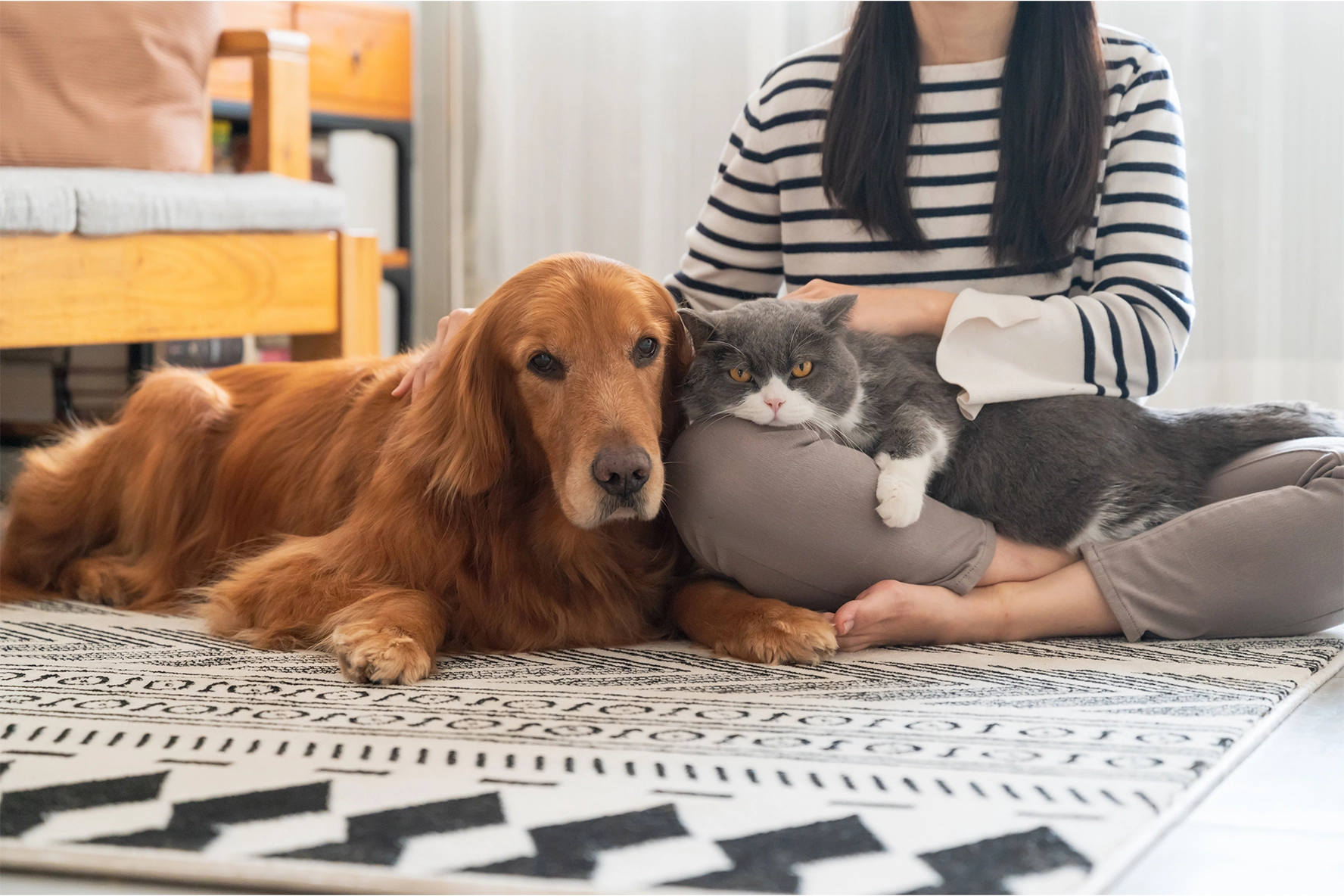
When your pet isn’t getting the most out of life anymore, it’s time to start thinking about what their future might hold, as well as the possibility of the end of their life.
Identifying your pet’s quality of life
When your pet starts moving towards the end of their life a lot of things will change for them. While a cancer diagnosis may feel like it’s going to be the end of the road for your pet, there are times that you can better clarify what your pet is really experiencing.
Yes, your dog having lymphoma can greatly change the way they behave and experience life, the same way that sickness would affect you. But being mindful of the level of change can help to clarify your pet’s honest status when it comes to their quality of life.
Caesar Millan, well-known for his show The Dog Whisperer, popularized a way to recognize whether your pet is lacking in their quality of life and to what degree. It’s called the HHHHHMM scale which stands for: Hurt, Hunger, Hydration, Happiness, Mobility, More good days than bad.
The way the scale works is you would rank your pet on a scale of 0-10 in each category, 0 being the worst and 10 being the most healthy.
- Hurt: Does your dog show signs of pain? Do they have a hard time breathing?
- Hunger: Is your dog eating enough? Do you need to hand feed them?
- Hygiene: Your dog should be regularly brushed and bathed. Do they have any spots that are more tender than others? Do they have any wounds that you are keeping clean?
- Happiness: Does your dog show joy? Are they separating themselves from the family and isolating themselves?
- Mobility: Is your dog getting around by themselves? Do you need to help them stand? Are they still able to go for walks, even if they’re shorter?
- More good days than bad: Paying attention to the days on whether there are more good or bad days.
If your score is less than 35 you may need to talk to your vet about what should be the next moves for your pet. Whether it’s time to start planning for euthanasia or considering a change of prescriptions.¹
When your best option is Euthanasia
Hearing that your dog is not experiencing life from a good perspective and that it would be best for them to pass on, is never going to be an easy thing to cope with. It’s not something you would want to hear about any family member, four-legged or otherwise.
Emotions can be difficult to manage and comprehend when you are presented with the end of your dog’s life as a choice you have to make for them. It’s not an easy decision to make and requires you to be able to assess the option from a perspective that excludes any selfish wishes to keep your best friend around for as long as possible.
Your vet wants what is best for your pet at all stages of their life—be sure that you are talking to them during your decision process. They will be ready to support you in making the best choice for your dog’s happiness.
Before the time comes for the official appointment, ask your vet any questions you may have. Doubts or misconceptions about the process can make it harder on you emotionally than it already would be. Your vet is on your side when this decision comes around, and answering any questions you have or clarifying anything about the process will be no problem for them. They often have a hard time with a patient’s time coming as well and are sympathetic to the animal’s family’s emotions.⁵
Prior to putting your dog to sleep
Emotionally preparing for the end of a family member’s life can be a really confusing feeling. Even if you understood that your pet’s time was coming from seeing the quality of their life diminishing before you made the decision with your vet that it’s their time, the emotions of the day approaching can be overwhelming.
Managing anticipatory grief before the day comes is an important step in coping with the loss. Depending on the family your pet has, you may have to do some emotional work for the other members of the family as well.
If you have children, it’s important to make the right decision for what you tell them about the future of your pet. Depending on their emotional maturity, you may be able to explain the concept of death or even the difference between going to sleep and your dog being put to sleep. Some children may not be able to process death yet, but be mindful that when a parent tells their child that their dog “went to a farm up north” when that child realizes the true meaning at an older age they may feel betrayed for not being able to say a proper goodbye to their furry friend. With children, it’s a delicate line to walk.² ³ ⁴
Plan for the day of the appointment as much as possible in advance. There is going to be a lot of emotional strain the day of, and having as much planned out will limit the decisions you have to make in the moment. Plan for things like who is going to say goodbye and when, who will go to the vet, who will be in the room when the time comes. It’s going to feel weird to plan a last day like this, but it will make it easier for you to give your dog the time to say goodbye to everyone who cares about them, and keep any extra stressors for you or your dog to a minimum.⁵
How to mourn your pet after they’re gone
There is no right way to mourn a pet. Everyone has a unique bond with their furry family members, and trying to assign the proper way—or length of time—to mourn would be impossible and insensitive. The only thing that is certain when it comes to your grief is that it will take time to heal.
Some people will feel guilt after their pet has passed on as if there should have been more that they could have done. Your feelings are valid and wishing you could have done more is a natural response to losing a loved one. Saying goodbye is always hard and it can hurt more when you’re the one who made the decision. Try to focus on the life you gave them before their age or sickness caught up with them. Remember the parts of them that were uniquely them.
Some will feel a sense of denial, maybe they can’t believe that they will never see their dog again. This happens often with children, especially if the loss of their pet is the first encounter they’ve had with death. For some who were not in the room with their pet when the final moments passed it can be harder to believe that they really are gone.
Feeling angry is another natural response, if your pet was taken away from you before you feel they should have been it’s natural to be mad at the cause. Whether it was lymphoma, age, or an accident. That thing that caused your friend to leave the world forever, and it makes sense that you should harbor negative feelings towards whatever happened.
The most common reaction to the loss of a pet, which can be at the beginning of the reaction or after another common response, is depression. A deep sadness comes from the loss of a constant loving companion. This emotion can stay for a short time or a long time, it entirely depends on the person and their dog. There is no right length of time to feel sadness after a loved one has passed and it is important to allow yourself the time to grieve.²
Our Recommendations
Taking the required amount of time you need to grieve is important for allowing yourself to heal. There isn’t anyone who can decide the value that your pet had to you, and no one can tell you how long to spend mourning.
It may be tempting to go to a shelter very soon after your dog passes on but we recommend you wait until you feel more comfortable with the change. It can be hard on a new dog if you bring them in to replace the first. Every dog has its own personality, and bringing a new dog to replace the old one may be unsatisfying to you when they don’t act the same. You should make sure that you are emotionally ready to allow a new individual into your life before you set out to give another dog a home.
We also recommend that if you have other pets in your home, that you do the best you can to maintain a regular schedule with them. Your other pets have lost a family member as well; it can cause your other pets to react stronger when their routine is altered along with the other big change of a member of their family not coming home.
REFERENCES:
- https://www.cesarsway.com/understanding-the-dog-quality-of-life-scale/
- https://www.pet-loss.net/
- https://www.humanesociety.org/resources/coping-death-your-pet
- https://www.helpguide.org/articles/grief/coping-with-losing-a-pet.htm
- https://wagwalking.com/wellness/seven-ways-to-prepare-for-a-planned-euthanization


